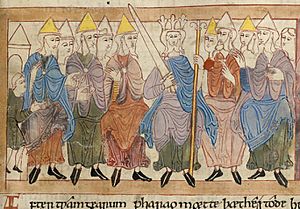Witenagemot facts for kids

The Witenagemot or Witan was a very important group in Anglo-Saxon England. It existed for a long time, from around the 600s to the 1000s. The name comes from Old English and means "council of the wise men." Think of it like an early form of a government meeting.
Contents
What Was the Witenagemot?
The Witenagemot was a council made up of important people. These "wise men" included bishops, abbots, and powerful nobles. They met to help the king make big decisions for the kingdom. It was a bit like a modern-day parliament, but it didn't have a fixed meeting place.
What Did the Witan Do?
The main job of the Witenagemot was to advise the king. They talked about how the kingdom should be run. They also helped to create and change laws. Here are some of their key roles:
- They helped decide who would be the next king. They could even choose a new king if the old one died.
- They had the power to remove a king if he was not doing a good job. For example, they removed King Sigeberht of Wessex in 755. They also removed Æthelwald Moll of Northumbria in 765.
- They discussed important matters about the country's safety and future.
Where Did They Meet?
Unlike today's parliaments that meet in one building, the Witenagemot meetings moved around. They would meet in different places across England. This was because the king and his court also traveled a lot. Meetings usually happened at least once a year, often more.
The End of the Witan
The Witenagemot was a powerful group for many centuries. However, things changed after the Norman invasion in 1066. When the Normans took over, they brought their own system of government. They replaced the Witenagemot with a new council. Even so, the name "Witan" was sometimes still used for this new group until the 1100s.
See also
 In Spanish: Witenagemot para niños
In Spanish: Witenagemot para niños
 | Bessie Coleman |
 | Spann Watson |
 | Jill E. Brown |
 | Sherman W. White |

